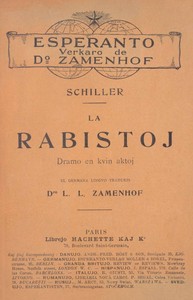| Author |
Schiller, Friedrich, 1759-1805 |
| Translator |
Zamenhof, L. L. (Ludwik Lejzer), 1859-1917 |
| Uniform Title |
Die räuber. Esperanto
|
| Title |
La Rabistoj: Dramo en kvin aktoj
|
| Note |
Reading ease score: 68.6 (8th & 9th grade). Neither easy nor difficult to read.
|
| Credits |
Andrew Sly, Miroslav Malovec and the Online Distributed Proofreading Team at https://www.pgdp.net (This book was produced from images made available by the HathiTrust Digital Library.)
|
| Summary |
"La Rabistoj: Dramo en kvin aktoj" by Friedrich Schiller is a dramatic work written in the early 19th century. This play revolves around complex themes of familial loyalty, honor, and individual rebellion against societal constraints, embodying the tumultuous dynamics between two brothers, Karolo and Francisko de Moor, as they navigate their conflicting loyalties and fates. The opening of the drama introduces us to a poignant family situation, with the aged Count de Moor fearing for the fate of his wayward son, Karolo, who has fallen into disreputable circumstances. As his brother Francisko reveals the disgraceful actions of Karolo — including acts of violence and betrayal — the elder Moor struggles with deep emotional turmoil and a desire for understanding. The scene sets a powerful tone of familial tension, illustrating the debilitating effects of shame and honor while paving the way for Karolo's evolving identity that intertwines with themes of freedom and rebellion, as both brothers grapple with their love and loyalty to each other amidst chaos. (This is an automatically generated summary.)
|
| Language |
Esperanto |
| LoC Class |
PT: Language and Literatures: Germanic, Scandinavian, and Icelandic literatures
|
| Subject |
Brothers -- Drama
|
| Subject |
Tragedies
|
| Subject |
Inheritance and succession -- Drama
|
| Subject |
German drama -- Translations into Esperanto
|
| Category |
Text |
| EBook-No. |
65958 |
| Release Date |
Jul 30, 2021 |
| Copyright Status |
Public domain in the USA. |
| Downloads |
42 downloads in the last 30 days. |
|
Project Gutenberg eBooks are always free!
|

